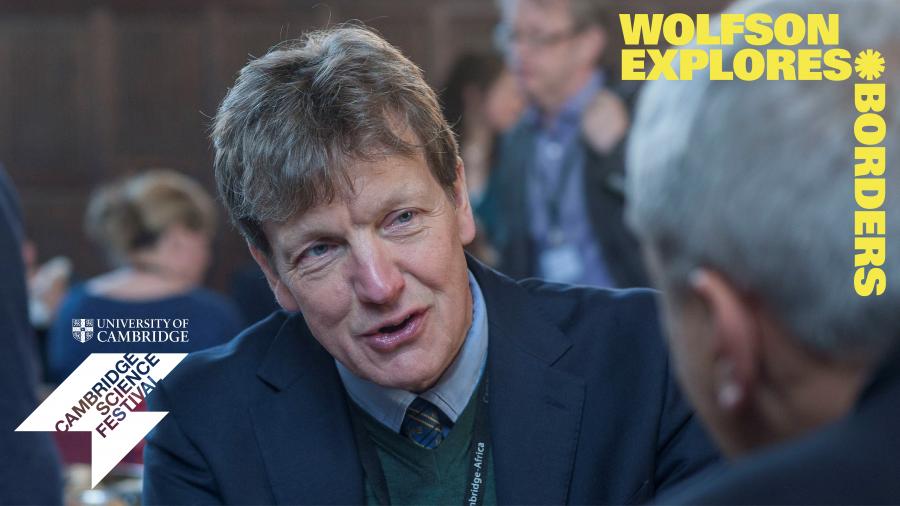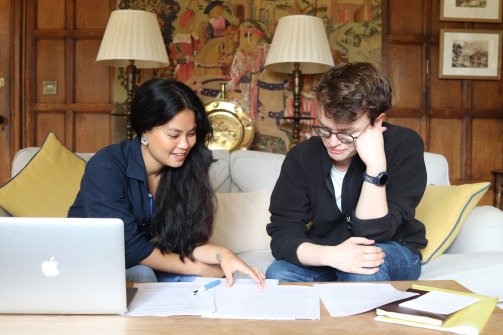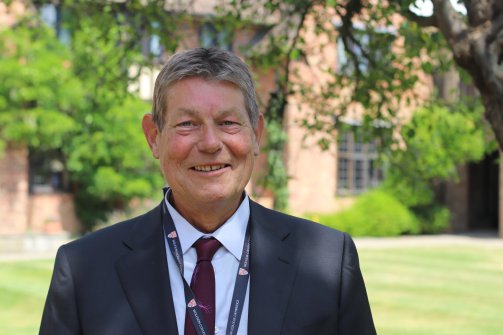New Press Fellows arrive at Wolfson


Two months ago, Fellow of Wolfson Professor James Wood was preparing to give a lecture at Wolfson College for the Cambridge Festival of Science entitled, Diseases without Borders – Emerging infectious diseases in Africa. On 4 March, he came to College for the annual Fellows' Night dinner and commented, "I'm going to have to change the title of this talk. All anyone wants to hear about is coronaviruses."

Within days of Fellows' Night, that lecture, along with the rest of the Festival of Science, was cancelled, the warm handshakes shared by the Fellows that evening replaced with wary social distancing, and all University buildings shuttered. Like much of academic Cambridge, James is now working from home and closely following the course of the coronavirus COVID-19 as it progresses across the world.
James, who is Head of the Department of Veterinary Medicine, is a veterinary epidemiologist and expert in infectious zoonotic diseases. He studies the dynamics of infectious diseases in wild animals including viral disease in bats — believed to be the origin of COVID-19, possibly via an intermediary host such as pangolins. He also studies mammalian influenza, TB in Ethiopian cattle, African swine fever in pigs and more. We asked him for his thoughts on the origins of the virus, the progress of testing the public and the future of herd immunity.
You’ve got quite a varied background for a vet. What let you to your current position?
I trained at the Royal Veterinary College in London, where I did an intercalcated degree that included a year in physiology at UCL. I qualified as a vet in 1988, by which time I had developed interest in agricultural diseases and spent the first year after qualifying as a shepherd running a lamb production study in Thetford.
The next few years saw a number of changes: a post at a mixed veterinary practice, a stint working for DEFRA (then MAFF) looking for BSE in sheep and goats, and in 1991 a Master's in Epidemiology at the London School of Hygiene and Tropical Medicine. Having grown up with horses, I swore I would never work with horses (or perhaps their owners…), but for 15 years I worked at the Animal Health Trust in Newmarket, completing a PhD at the Open University.
I began working with colleagues in Cambridge and that was a turning point. We wrote a grant that resulted in £5 million in funding from DEFRA and the Higher Education Funding Council over 5 years in 2005, which included me in the post of the Director of the Cambridge Infectious Diseases Consortium (CIDC). In 2008, I was appointed Alborada Professor of Equine and Farm Animal Science in 2008. In 2013 I became Head of the Vet School.
How did the Cambridge-Africa connection come about?
At CIDC, we wanted to bring more vets into research and training, at that time particularly to address problems that led to BSE and Foot and Mouth disease in 2001. We put together a multidisciplinary team of clinicians, epidemiologist, statisticians and geneticists to focus on the threat of emerging animal and human infectious disease outbreaks and the risk factors that contribute to the global spread of disease.
One of our Fellows, David Hayman, desperately wanted to get into wildlife work and ended up doing research into RNA viruses in fruit bats in Ghana. That established a connection with the University of Ghana and its Pro-Vice Chancellor, Professor Yaa Ntiamoa-Baidu. Another Cambridge researcher, parasitologist Professor David Dunne of the Department of Pathology, had worked for many years with African colleagues on neglected tropical diseases. In 2008 these links began to coalesce and Dunne became the founding Director of a new programme named Cambridge-Africa, created to support research priorities in Africa. Since then, I have spent a lot of time in both west and east Africa, working on identifying and understanding emerging diseases and also trying to support African academic capacity building and collaboration programmes.
What are the conditions that lead to the spread of these diseases?
Infectious diseases are spread by global interconnectivity and often emerge where the local population suffers from social and economic insecurity. The issue isn't indigenous people eating animals they have always eaten. The real issue is international trade and exploitation. There is a booming trade in wildlife products for presumed medicinal purposes, particularly in Asia. In west Africa, the widespread trade of bush meat can lead to increased animal-human contact that allows a virus to make the leap from an animal host to humans.
How leaps between species occur is virus-specific. Some viruses need to adapt to spread; bird flu for instance often needs to undergo several mutations to infect humans. The SARS coronavirus seemed to have the ability to transmit between bats and a secondary host which was palm civets. SARS started not in one single market in one week, but over a period of months through an epidemic of civets that were being traded in China. But despite clear evidence that these incidents were driven by the proximity of people to traded wildlife, there has been no concerted effort to halt the trade of living wild animals, and it seems that the coronavirus that causes COVID-19 is the result.
You’ve been advocating for widespread serological testing for COVID-19. What is needed for that to happen?
To test whether someone has COVID-19 a PCR test is required to detect viral RNA in a sample taken from a nasal swab (such as that done by the Baker Lab at Addenbrooke’s hospital). If positive, the person is infected by the virus and is themselves infectious. But some infected people display few if any symptoms. To find out if someone has been infected requires a blood test to identify antibodies produced by the immune system in response to the disease (or to a vaccine, which does not yet exist). Only this test can tell us who has had the disease even though they may have been asymptomatic.
The big problem for epidemiologists moving forward is the exit strategy. Knowing how many people have immunity to the disease is critically important. Until the proportion of the population that has been infected has been tested and results published, we lack evidence for what the next policy changes should be.
There are other things that more widespread serological testing may be able to help us understand. For instance, why are young people not getting ill – that’s quite unusual for a virus like this. And there is also a huge variability in the severity of the disease which may indicate there is a strong genetic underpinning to a person's susceptibility. This will be much clearer when we start doing serology. That's why it's so important to get the data in the first place.
There are great new centres in Milton Keynes and also in Cambridge, set up by the University and AstraZeneca, but there's going to be a lot more sorts of data we need as we progress through this epidemic. And it is becoming clearer that we need more logistics around sample collection, as well as laboratory capacity.
What are some of the other ways we need to move forward to prevent these kinds of pandemics in the future?
There are things that a number of us have been saying about the risks of diseases coming from wildlife even before COVID-19. Some things are very clear. We should actively be trying to get rid of live wildlife markets such as the one in Wuhan where we believe this virus emerged. They pose such disease risks and they aren’t great for the animals either. When it comes to bush meat, the situation is more complicated and nuanced, but we need to do something about the bushmeat trade too. These urgently need to be addressed with a coordinated international effort.
There's been very good sharing of quality data that has come about due to collaborations between scientists in China and the UK, Australia and Africa. But we need more powerful tools to make sure we have early and rapid information exchange. Formal surveillance programmes for emerging threats like this rely on case definitions and the problem with a new disease is it doesn’t fit into a case definition. We are going to learn a lot of important lessons over the next weeks and months in terms of medical and political response.
Professor James Wood became a Senior Member of Wolfson College in 2005, having been introduced to College by his Head of Department and colleague Professor Duncan Maskell. When he was elected to a Professorship in 2008 James became a Fellow of Wolfson College. Follow James on Twitter @jw132







